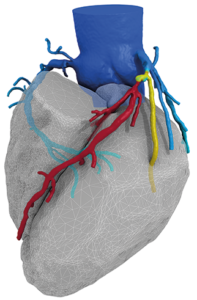
HeartFlow has announced that 10-year follow-up data from its DISCOVER-FLOW study were published in the Journal of Cardiovascular Computed Tomography.
At 10 years, HeartFlow’s FFRCT Analysis, a non-invasive test for coronary artery disease (CAD), showed strong long-term risk stratification and displayed the risk continuum as effectively as invasive fractional flow reserve (FFR).
DISCOVER-FLOW was the first trial evaluating the HeartFlow FFRCT Analysis and the new analysis aimed to determine the long-term prognostic implications of lesion-specific FFRCT in patients with suspected or known CAD.
Findings from the study indicate that FFRCT was as predictive of patient outcomes through 10 years as invasive FFR, lesions with lower FFRCT values were associated with ever-higher rates of cardiovascular death, heart attack, or a need for revascularisation (stenting or bypass surgery) over the 10-year period. FFRCT was superior to CCTA stenosis severity alone for diagnosis of lesion-specific flow impairment.
“It’s rare to have the opportunity to follow patients for 10 years in clinical trials and we are delighted to confirm the long-term prognostic value of FFRCT through the DISCOVER-FLOW study,” said Campbell Rogers, chief medical officer, HeartFlow. “These data are a reflection of our commitment to providing comprehensive clinical evidence on the diagnostic accuracy, safety, efficacy, and utility of the HeartFlow Analysis.”
HeartFlow is the first company to offer a suite of technologies to help clinicians non-invasively identify and quantify narrowings in the coronary arteries (RoadMap Analysis), assess the impact of each specific narrowing on coronary blood flow (FFRCT Analysis), and characterise and quantify coronary atherosclerosis (Plaque Analysis).













